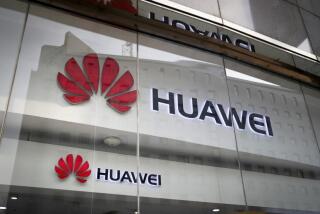Western Digital Gets Access to Latest AT&T; Technology on Chips
- Share via
Western Digital Corp. and AT&T; announced on Monday a three-year agreement that gives the Irvine electronics manufacturer access to the communications giant’s latest chip-making technology in exchange for ordering up to $50 million worth of goods from AT&T; plants.
Western Digital officials said the deal would give them a major technological boost into the latest generation of integrated circuit manufacturing at a relative bargain price.
“This assures us that if we design the right products for the right market we will be offering our customers the latest technology in chips,” said an enthusiastic Western Digital President and Chief Executive Roger Johnson.
The deal calls for Western Digital to have the right to design integrated circuits, or chips, using AT&T;’s latest, ultra-narrow circuitry technology. This technology allows an electric impulse to be carried in channels a mere 1.25 microns wide, an advance that permits more circuitry to fit on a chip. Most chips, including those made by Western Digital in its Irvine plant, have circuits about 3 microns wide.
In exchange for access to the new technology, Western Digital has guaranteed that it will use AT&T; manufacturing facilities to make some of its new chip products. The value of the contract is a minimum of $8 million over three years, but could range as high as $20 million if Western Digital’s most optimistic business plans are realized.
In addition, Western Digital has agreed to allow AT&T; to build up to $30 million worth of its existing product line at Western Digital’s under-used manufacturing plants.
Johnson said it would have cost Western Digital $50 million to $75 million to develop on its own the advanced technology it is getting from AT&T.;
Analysts said the deal allows AT&T; to put its excess manufacturing capacity to work without helping a direct competitor while earning up to $50 million from its investment in its factories.
“It’s perfectly logical for both sides,” said David Townes, an analyst for Needham & Co. Inc. in New York.
More to Read
Inside the business of entertainment
The Wide Shot brings you news, analysis and insights on everything from streaming wars to production — and what it all means for the future.
You may occasionally receive promotional content from the Los Angeles Times.









